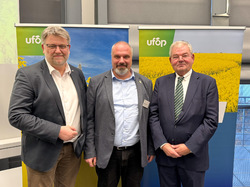GHG Quota Act sets long-term framework for more biofuels and climate protection
UFOP calls for faster deliberations and a roadmap for alternative fuels
Hanover, 11 November 2025 – Torsten Krawczyk, Chairman of the Union for the Promotion of Oil and Protein Crops (UFOP), calls for swift deliberation and decision-making on the amendment to the GHG Quota Act at a press conference at Agritechnica in Hanover. The Act is intended to transpose the amended Renewable Energy Directive (RED III) into national law, thereby creating a long-term framework for biofuels. The implementation deadline expired already at the end of May 2025.
The UFOP chairman therefore describes the delay in inter-ministerial coordination, particularly on the part of the Federal Environment Ministry, as incomprehensible and irresponsible. For the entire supply chain, from cultivation and processing by biofuel producers to companies in the mineral oil industry that are subject to quotas, it is very important that the law comes into force on 1 January 2026, at the start of the new quota year. The German parliament „Bundestag“ and the second chamber „Bundesrat“ are now called upon to compensate for this delay so that, above all, the measures to prevent fraud can come into force quickly.
 Krawczyk welcomes the continuation of the defossilisation strategy provided for in the draft law, with a gradual increase in the GHG quota obligation to 53% by 2040. The electrification of drive systems in combination with the targeted use of low-CO2 alternative fuels must determine the strategy for this commitment period. At the same time, UFOP expects that the law will also eliminate an important incentive for fraud by double counting biofuels from certain types of waste. Sustainable biofuels with a binding greenhouse gas footprint stated in the sustainability certificate are a product that inspires confidence. The UFOP chairman emphasised that certification must be carried out and documented by certification bodies in accordance with strict controls, not only in the EU but also in third countries. UFOP strongly welcomes the tightening of documentation, accreditation regulations and qualification requirements for certifiers provided for in the law.
Krawczyk welcomes the continuation of the defossilisation strategy provided for in the draft law, with a gradual increase in the GHG quota obligation to 53% by 2040. The electrification of drive systems in combination with the targeted use of low-CO2 alternative fuels must determine the strategy for this commitment period. At the same time, UFOP expects that the law will also eliminate an important incentive for fraud by double counting biofuels from certain types of waste. Sustainable biofuels with a binding greenhouse gas footprint stated in the sustainability certificate are a product that inspires confidence. The UFOP chairman emphasised that certification must be carried out and documented by certification bodies in accordance with strict controls, not only in the EU but also in third countries. UFOP strongly welcomes the tightening of documentation, accreditation regulations and qualification requirements for certifiers provided for in the law.
In view of the recent cases of fraud that have come to light, UFOP Chairman Krawczyk demands that the EU Member States and, above all, the EU Commission, which is responsible for the functioning of the future Union Database (UDB), stop passing on sustainability certificates that are subject to verification. UFOP very much welcomes the fact that the draft national biofuel sustainability regulation which has still to be adopted by the Federal Cabinet, the expected decision this week has been postponed once again, includes the condition for registration in the BLE's ‘Nabisy’ database that the biofuel producer, as the final interface in the sustainability verification process, must agree to an on-site inspection. This regulation should be adopted by all EU member states and the EU Commission responsible for the UDB in order to rule out any possibilities of circumvention.
UFOP is concerned about the recent decision by the EU Commission to allow the use of raw materials from catch crops and cultivation on degraded land. This creates unnecessary potential for fraud. UFOP therefore takes a very critical view of this option and has presented a discussion paper for further debate. In it, UFOP points out, for example, that catch crops cannot be grown as threshable crops in the EU. Krawczyk strongly criticised the Commission's approval, saying it was incomprehensible from an agricultural point of view.
Instead of creating new incentives for questionable raw material potential, UFOP calls for the available sustainable biofuel potential to be exploited as a result of a coordinated fuel strategy based on current fuel standards, Krawczyk proposed. With B20/B30, B100, HVO100, E10 and E20, blending windows already exist in the national regulatory law, with the exception of E20. Pure fuels such as biodiesel and HVO could already be used today in existing fleets, both in heavy-duty transport and in construction and agriculture. With such a roadmap for alternative fuels, maximum benefits for climate protection could be achieved in a relatively short time.


 Union zur Förderung von Oel- und Proteinpflanzen E.V.
Union zur Förderung von Oel- und Proteinpflanzen E.V.